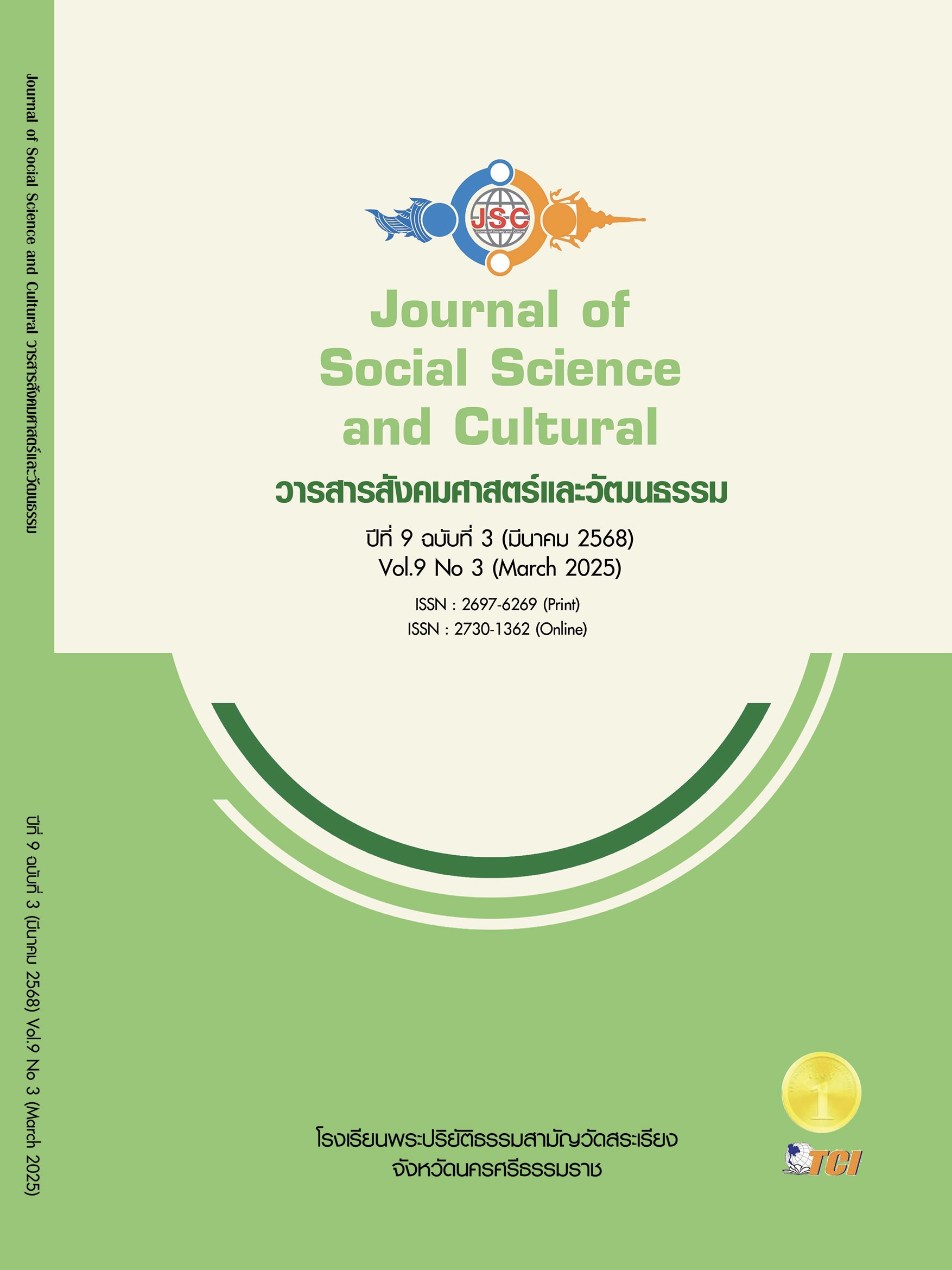THE EFFECTS OF PROJECT-BASED LEARNING APPROACH ON THE TOPIC OF ECOSYSTEM IN SCIENTIFIC PROBLEM-SOLVING ABILITY AND SCIENTIFIC ATTITUDES OF MATHAYOMSUKSA 3 STUDENTS AT TRANG CHRISTIAN SUKSA SCHOOL IN TRANG PROVINCE
Main Article Content
Abstract
This research aimed to 1) Compare the science problem solving ability of Mathayom 3 students who received the project-based learning on the topic of Ecosystem with the group who received the conventional learning method, and 2) Compare the science attitude of students between the groups who received both learning formats. The sample consisted of 50 Mathayom 3 students at Trang Christian School, Trang Province, in the second semester of the academic year 2023, selected by cluster random sampling. They were divided into an experimental group that received the project-based learning method and a control group that received the conventional learning method. Both groups of samples consisted of students with different ability levels (good, average, weak) in a balanced manner. The research instruments were 1) 11 project-based learning plans on the topic of Ecosystem, 2) A science problem-solving ability test, and 3) A science attitude test. Data were analyzed using mean, standard deviation, and t-test. The results of the research found that students in the project-based learning group had higher science problem-solving ability than those in the conventional learning group. At a statistical significance level of .05, students in the group that received project-based learning had higher scientific attitudes than those in the group that received normal learning, at a statistical significance level of .05. Recommendations: Teachers should promote project-based learning in science subjects because it helps develop problem-solving skills and strengthens students' scientific attitudes more effectively in science.
Article Details
References
กระทรวงศึกษาธิการ. (2560). ตัวชี้วัดหลักสูตรแกนกลางกลุ่มสาระการเรียนรู้วิทยาศาสตร์ (ฉบับปรับปรุง พ.ศ. 2560). ชุมนุมสหกรณ์การเกษตรแห่งประเทศไทย. กรุงเทพมหานคร: โรงพิมพ์ชุมนุมสหกรณ์การเกษตรแห่งประเทศไทย.
นวลจิตต์ เชาวกีรติพงศ์. (2560). หน่วยที่ 9 การจัดการเรียนการสอนวิทยาศาสตร์ 2. ใน เอกสารประกอบการเรียนวิชาสารัตถะวิทยวิธีและธรรมชาติของวิทยาศาสตร์. มหาวิทยาลัยสุโขทัยธรรมาธิราช .
พัฒน์ชนน คงอยู่ และคณะ. (2562). การจัดการเรียนรู้โดยใช้กิจกรรม โครงานเป็นฐาน เรื่อง งานและพลังงานกรณีศึกษาโรงเรียนมัธยมวัดเขาสุกิม. วารสารแสงอีสาน, 16(2), 50-68.
สถาบันส่งเสริมการสอนวิทยาศาสตร์และเทคโนโลยี. (2560ก). กรอบโครงสร้างการประเมินผลนักเรียนโครงการ PISA 2015. กรุงเทพมหานคร: กระทรวงศึกษาธิการ.
สถาบันส่งเสริมการสอนวิทยาศาสตร์และเทคโนโลยี. (2560ข). คู่มือการวัดเจตคติทางวิทยาศาสตร์ . กรุงเทพมหานคร: สถาบันส่งเสริมการสอนวิทยาศาสตร์และเทคโนโลยี.
สถาบันส่งเสริมการสอนวิทยาศาสตร์และเทคโนโลยี. (2565). คู่มือการจัดกิจกรรมโครงงานวิทยาศาสตร์. กรุงเทพมหานคร: สถาบันส่งเสริมการสอนวิทยาศาสตร์และเทคโนโลยี.
สำนักงานเลขาธิการสภาการศึกษา. (2560). แผนการศึกษาแห่งชาติ พ.ศ. 2560 - 2579. (พิมพ์ครั้งที่ 1). กรุงเทพมหานคร: บริษัทพริกหวานกราฟฟิค.
สุภามาส เทียนทอง. (2553). การพัฒนาความสามารถในการแก้ปัญหา ของนักเรียนชั้นประถมศึกษาปีที่ 5 ที่จัดการเรียนรู้โดยใช้ปัญหาเป็นฐาน. ใน วิทยานิพนธ์ศึกษาศาสตรมหาบัณฑิต สาขาวิชาหลักสูตรและการนิเทศ. มหาวิทยาลัยศิลปากร.
Blumenfeld, C. P. et al. (1991). Motivating project-based learning: Sustaining the doing, supporting the learning. Educational psychologist, 26(3-4), 369-398.
Chaowakeratipong, N. (2017). Lesson Plans Writing in Instructional Science Subject. Veridian E-Journal, Silpakorn University, 10(1), 111-127.
Krajcik, J. & Blumenfeld, P. (2006). 19. Project-Based Learning. In The Cambridge Handbook of the Learning Sciences. New York: Cambridge University Press.
Leekitwattana, P. & Pimdee, P. (2007). Demand for Industrial Technicians' Manpower of Establishment in In Industrial Estates. (Research Report). Bangkok: King Mongkut's Institute of Technology Ladkrabang.
Likert, R. (1967). The Method of Constructing and Attitude Scale. Attitude Theory and Measurement. Fishbeic, Martin, Ed. New York: Wiley & Son.
Mehrens, W. A. & Lehmann, L. J. (1984). Measurement and evaluation in education and psychology. New York: Rinehart and Winston.
Osborne, J. et al. (2003). Attitudes towards science: A review of theliterature. International Journal of Science Education, 25(9), 1049-1079.
Piriyawat, K. (2011). A Study on science learning achievement and ability in solving scientificproblems through problem-based learning and solving scientific problems metacognitive strategies of Matthayomsuksa 1 student. In Master's Thesis, Science Education. Srinakarinwirot University.
Thomas, J. W. & Mergendoller, J. R. (2000). Managing project-based learning: Principles from the field. Paper presented at the Annual Meeting of the American Educational Research Association. New Orleans: American Educational Research Association.


